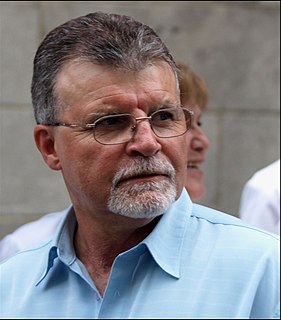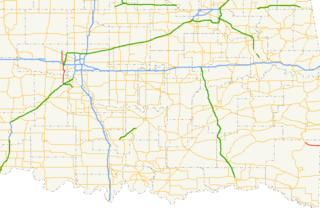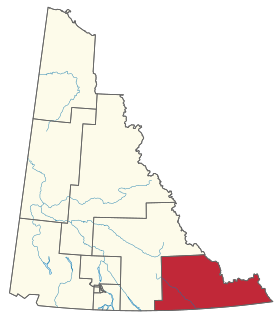
Desha County is a county located in the southeast part of the U.S. state of Arkansas, with its eastern border the Mississippi River. As of the 2010 census, the population was 13,008. It ranks 56th of Arkansas's 75 counties in terms of population. The county seat is Arkansas City. Located in the Arkansas Delta, Desha County's rivers and fertile soils became prosperous for planters under the cotton-based economy of plantation agriculture in the antebellum years and late 19th century. Still largely rural, it has suffered population losses and economic decline since the mid-20th century.

Pine Bluff is the tenth-largest city in the state of Arkansas and the county seat of Jefferson County. It is the principal city of the Pine Bluff Metropolitan Statistical Area and part of the Little Rock-North Little Rock-Pine Bluff Combined Statistical Area. The population of the city was 49,083 in the 2010 Census with 2019 estimates showing a decline to 41,474.

Yukon is a city in eastern Canadian County, Oklahoma, United States. It is part of the Oklahoma City Metropolitan Area. The population was 22,709 at the 2010 census. Founded in the 1890s, the town was named in reference to a gold rush in Yukon Territory, Canada, at the time. Historically, Yukon served as an urban center for area farmers and the site of a large milling operation. It is now considered primarily a bedroom community for people who work in Oklahoma City.
The Alaska Highway was constructed during World War II to connect the contiguous United States to Alaska across Canada. It begins at the junction with several Canadian highways in Dawson Creek, British Columbia, and runs to Delta Junction, Alaska, via Whitehorse, Yukon. When it was completed in 1942, it was about 2,700 kilometres (1,700 mi) long, but in 2012, it was only 2,232 km (1,387 mi). This is due to the continuing reconstruction of the highway, which has rerouted and straightened many sections. The highway opened to the public in 1948. Once legendary for being a rough, challenging drive, the highway is now paved over its entire length. Its component highways are British Columbia Highway 97, Yukon Highway 1 and Alaska Route 2.

The White Pass and Yukon Route is a Canadian and U.S. Class II 3 ft narrow-gauge railroad linking the port of Skagway, Alaska, with Whitehorse, the capital of Yukon. An isolated system, it has no direct connection to any other railroad. Equipment, freight and passengers are ferried by ship through the Port of Skagway, and via road through a few of the stops along its route.

The Department of Alaska was the designation for the government of Alaska from its purchase by the United States of America in 1867 until its organization as the District of Alaska in 1884. During the department era, Alaska was variously under the jurisdiction of the U.S. Army, the U.S. Dept. of the Treasury and the U.S. Navy. The area later became the District of Alaska, then the Territory of Alaska, then the State of Alaska.

Dennis G. Fentie was a Canadian politician. He was the seventh Premier of Yukon and leader of the Yukon Party, serving from 2002 to 2011, as well as the MLA for Watson Lake.

Bennett Lake is a lake in the Province of British Columbia and Yukon Territory in northwestern Canada. It is just north of the border with the United States state of Alaska, near the Alaskan port of Skagway.

Watson Lake is a town in Yukon, Canada, located at mile 635 on the Alaska Highway close to the British Columbia border. The Canada 2016 Census put the population at 790, a drop of 1.5% from 802 in 2011. The town is named for Frank Watson, an American-born trapper and prospector, who settled in the area at the end of the nineteenth century.

Erik Nielsen Whitehorse International Airport is an international airport located in Whitehorse, Yukon, Canada. It is part of the National Airports System, and is owned and operated by the Government of Yukon. The airport was renamed in honour of longtime Yukon Member of Parliament Erik Nielsen on December 15, 2008. The terminal handled 294,000 passengers in 2012, representing a 94% increase in passenger traffic since 2002. By 2017, this number had risen to 366,000. Air North is based in Whitehorse.

Alkan Air Ltd. is an airline headquartered in Whitehorse, Yukon, Canada. The company operates seven-day-a-week charter and air ambulance (medevac) services. The Whitehorse and Mayo (seasonal) bases generally focus on wheel and floatplane charter and medevac services in northern and western Canada and Alaska. The Nanaimo, BC base provides charter and medevac services, focused primarily in western Canada, the western United States and Mexico. From 2016 to 2018, Alkan also operated scheduled flights between Erik Nielsen Whitehorse International Airport and Watson Lake Airport.

State Highway 4, abbreviated as SH-4 or OK-4, is a designation for two distinct highways maintained by the U.S. state of Oklahoma. One of them serves as an important route through the suburbs west of Oklahoma City, while the other connects US-259 to the Arkansas state line west of Cove, Arkansas. SH-4 has no lettered spur routes.

The history of post-confederation Canada began on July 1, 1867, when the British North American colonies of Canada, New Brunswick, and Nova Scotia were united to form a single Dominion within the British Empire. Upon Confederation, the United Province of Canada was immediately split into the provinces of Ontario and Quebec. The colonies of Prince Edward Island and British Columbia joined shortly after, and Canada acquired the vast expanse of the continent controlled by the Hudson's Bay Company, which was eventually divided into new territories and provinces. Canada evolved into a fully sovereign state by 1982.

Watson Lake is an electoral district which returns a member to the Legislative Assembly of the Yukon Territory in Canada. The riding is one of the Yukon's eight rural ridings and is one of the oldest ridings in the Yukon.
The Canol Project was constructed during World War II to ensure a supply of oil for the defence of Alaska and the North American west coast. The project was completed in two years at an astronomical cost and was abandoned less than a year later.

Columbia was a sternwheel steamboat that ran on the Arrow Lakes in British Columbia from 1891 to 1894. Columbia should be distinguished from the many other vessels with the same or similar names, including in particular the propeller-driven steamboat Columbia that ran on the Arrow Lakes for many years.

Marine Transportation Services (MTS) formerly Northern Transportation Company Limited (NTCL) is a marine transportation company operating primarily in the Mackenzie River watershed of the Northwest Territories and northern Alberta, and the Arctic Ocean using a fleet of diesel tug boats and shallow-draft barges. NTCL filed for bankruptcy in 2016 and its assets were acquired by the Government of the Northwest Territories later that year.
Watson Lake Cone is a cinder cone in southern Yukon, Canada, located near the British Columbia-Yukon border. It formed and last erupted during the Pleistocene period and is part of the Northern Cordilleran Volcanic Province.
The COVID-19 pandemic in Yukon is part of an ongoing global pandemic of coronavirus disease 2019 (COVID-19), an infectious disease caused by severe acute respiratory syndrome coronavirus 2 (SARS-CoV-2). As of November 21, 2020 in the Canadian territory of Yukon has reported 29 confirmed cases of COVID-19, of which 22 have recovered and one has died. 4,509 tests have been completed, with 4,361 confirmed negative and 121 still under investigation.














